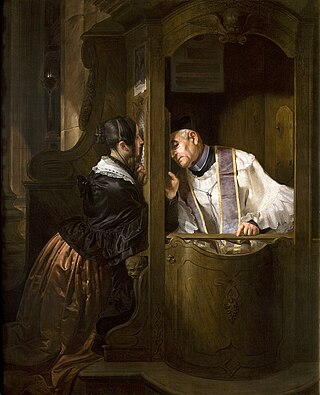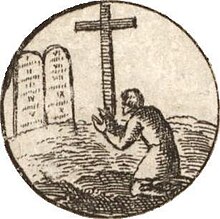
Confession, in many religions, is the acknowledgment of sinful thoughts and actions. This may occur directly to a god or to fellow people.

Penance is any act or a set of actions done out of repentance for sins committed, as well as an alternate name for the Catholic, Lutheran, Eastern Orthodox, and Oriental Orthodox sacrament of Reconciliation or Confession. It also plays a part in confession among Anglicans and Methodists, in which it is a rite, as well as among other Protestants. The word penance derives from Old French and Latin paenitentia, both of which derive from the same root meaning repentance, the desire to be forgiven. Penance and repentance, similar in their derivation and original sense, have come to symbolize conflicting views of the essence of repentance, arising from the controversy as to the respective merits of "faith" and "good works". Word derivations occur in many languages.
An Act of Contrition is a Christian prayer genre that expresses sorrow for sins. It may be used in a liturgical service or be used privately, especially in connection with an examination of conscience. Special formulae for acts of contrition are in use in the Anglican, Catholic, Lutheran, Methodist and Reformed Churches.
The five solae of the Protestant Reformation are a foundational set of Christian theological principles held by theologians and clergy to be central to the doctrines of justification and salvation as taught by the Calvinism and Lutheranism branches of Protestantism, as well as in some branches of Pentecostalism. Each sola represents a key belief in these Protestant traditions that is distinct from the theological doctrine of the Catholic Church, although they were not assembled as a theological unit until the 20th century. The Reformers are known to have only clearly stated two of the five solae. Even today there are differences as to what constitutes the solae, how many there are, and how to interpret them to reflect the Reformers' beliefs.

A mortal sin, in Christian theology, is a gravely sinful act which can lead to damnation if a person does not repent of the sin before death. It is alternatively called deadly, grave, and serious; the concept of mortal sin is found in both Catholicism and Lutheranism. A sin is considered to be "mortal" when its quality is such that it leads to a separation of that person from God's saving grace. Three conditions must together be met for a sin to be mortal: "Mortal sin is sin whose object is grave matter and which is also committed with full knowledge and deliberate consent." The sin against the Holy Spirit and the sins that cry to Heaven for vengeance are considered especially serious. This type of sin is distinguished from a venial sin in that the latter simply leads to a weakening of a person's relationship with God. Despite its gravity, a person can repent of having committed a mortal sin. Such repentance is the primary requisite for forgiveness and absolution.

In Christianity, contrition or contriteness is repentance for sins one has committed. The remorseful person is said to be contrite.

Absolution is a theological term for the forgiveness imparted by ordained Christian priests and experienced by Christian penitents. It is a universal feature of the historic churches of Christendom, although the theology and the practice of absolution vary between Christian denominations.
In the Catholic Church, the Seal of Confession is the absolute duty of priests or anyone who happens to hear a confession not to disclose anything that they learn from penitents during the course of the Sacrament of Penance (confession). Even where the seal of confession does not strictly apply – where there is no specific serious sin confessed for the purpose of receiving absolution – priests have a serious obligation not to cause scandal by the way they speak.

The Penitential Act is a Christian form of general confession of sinfulness that normally takes place at the beginning of the celebration of Mass in the Roman Rite of the Catholicism, as well as in Lutheranism.

Eucharistic discipline is the term applied to the regulations and practices associated with an individual preparing for the reception of the Eucharist. Different Christian traditions require varying degrees of preparation, which may include a period of fasting, prayer, repentance, and confession.
The Sacrament of Penance is one of the seven sacraments of the Catholic Church, in which the faithful are absolved from sins committed after baptism and reconciled with the Christian community. During reconciliation mortal sins must be confessed and venial sins may be confessed for devotional reasons. According to the dogma and unchanging practice of the church, only those ordained as priests may grant absolution.
The Seal of the Confessional is a Christian doctrine which affirms the special protection and privilege of the words spoken during confession between a penitent and his or her pastor. A form of this principle exists in the doctrine and practice of many modern Lutheran churches.
Lay confession is confession in the religious sense, made to a lay person.
In Lutheranism, the Eucharist refers to the liturgical commemoration of the Last Supper. Lutherans believe in the real presence of Christ in the Eucharist, affirming the doctrine of sacramental union, "in which the body and blood of Christ are truly and substantially present, offered, and received with the bread and wine."
Repentance is a stage in Christian salvation where the believer acknowledges and turns away from sin. As a distinct stage in the ordo salutis its position is disputed, with some theological traditions arguing it occurs prior to faith and the Reformed theological tradition arguing it occurs after faith. In Catholic theology, Lutheran theology, Orthodox theology and Anglican theology, repentance plays a key role in Confession and Absolution.
Lutheranism is a major branch of Protestantism, identifying primarily with the theology of Martin Luther, the 16th-century German monk and reformer whose efforts to reform the theology and practices of the Catholic Church launched the Protestant Reformation.
The Lutheran sacraments are "sacred acts of divine institution". They are also defined as “an outward and visible sign of an inward and spiritual grace.”.

There are seven sacraments of the Catholic Church, which according to Catholic theology were instituted by Jesus Christ and entrusted to the Church. Sacraments are visible rites seen as signs and efficacious channels of the grace of God to all those who receive them with the proper disposition.

A sacrament is a Christian rite that is recognized as being particularly important and significant. There are various views on the existence, number and meaning of such rites. Many Christians consider the sacraments to be a visible symbol of the reality of God, as well as a channel for God's grace. Many denominations, including the Roman Catholic, Lutheran, Presbyterian Anglican, Methodist, and Reformed, hold to the definition of sacrament formulated by Augustine of Hippo: an outward sign of an inward grace, that has been instituted by Jesus Christ. Sacraments signify God's grace in a way that is outwardly observable to the participant.
The General Confession is a prayer of contrition in various Christian denominations, including Lutheranism, Anglicanism, Methodism, and Roman Catholicism.











